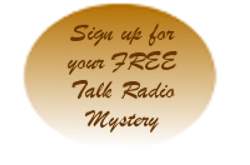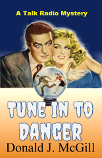“How could I have known that murder could sometimes smell like honeysuckle?”
Is it better to read the book before seeing the film or will you enjoy both more if you see the movie first?
Does a great book make a great film? Does knowing the ending ruin one or the other? Or are they two different art forms with little impact on each other?
Let's look at some book to movie adaptations and if you haven't read the book or seen the movie, try to decide which should come first.”
-
 Free Talk Radio Mystery
Free Talk Radio Mystery
Available Only Here!
Magic, mayhem and mystery—yours free!
Join the crowd and download it now. Plus, you'll get the latest dope on Jerry Jeremy and his pals, as well as whazzup with the chief dope, him being yours truly.
· Where do you get your ideas?
For my series books and stories, the main characters usually are the starting point and will dictate what happens as the story unfolds. These characters can come from anywhere. For example, my talk show host, Jerry Jeremy, was inspired by one of my favorite old movies. As for Madam Zoroaster, the psychic disaster, I just liked the way it sounded, so I made up someone who fit the name.
Once I have a few of the actors lined up, I'll need something for them to do and a place to do it. The place sets the tone of the story and plot pretty much comes from the people and places. The books practically write themselves.
Sure they do. Now pull the other one!
· What genre do you think your books fall in to?The Jerry Jeremy stories are screwball mysteries with a little romance mixed in. This sometimes tends to get them tagged as ‘cozy’ mysteries in that there’s not really a good category for comedic noir. I tend not to think of them as cozies though, because the main protagonist is a smart-alecky kind of guy who doesn't cook or quilt or do any gardening.
Anyway, a few years ago, an agent who thought I had the writing chops to turn out good work, turned down my first Talk Radio Mystery because she said a mix of humor and mystery didn't sell. It was hard to categorize in the stores. Good thing nobody told Janet Evanovich.
Anyway, I've stuck with crime and comedy because I not only like to write it, but also like to read it. Lawrence Block's Bernie Rhodenbarr, Donald E. Westalke's Dortmunder, Carl Hiassen's South Florida, the list goes on. I not only read them, but enjoy going back every couple of years and reading them again.
I do find that although comedy and murder mix, they require a little different slant on the storytelling. The clues show up in punchlines while the blood and gore are taken with a bit of gallows humor. It may not be the golden age of detection or new wave noir, but maybe the time has come for a golden age of soft-boiled crime. Magic, romance and murder—who could ask for more?
I also have a comedy mystery series for the YA market. In the Watson's Ghost series, Sherlock Holmes' great-great-great-nephew—a computer geek in today's world—meets up with Dr. Watson's gorgeous great-great-granddaughter and they try their hand at crime busting with a littl help from...well, who else—the good doctor's ghost. I've no idea where this one would get shelved.
· Describe your writing process? Where do you write? What do you use? Pen and ink? Gentle music?I'm not sure I'm organized enough to call what I do a process, but I write in snatches when and where I get the chance. I don't do much outlining in advance, but generally have some kind of vague idea of what will pull my characters into the action. I don't know how it will all end up, but I try to make the twists and turns of the plot reflect each character's reaction to a particular situation as as the story unfolds scene by scene.
I want to keep the story and the writing fresh and funny. To that end I write in the first person, seeing all the action and all the other characters through a single set of eyes. Those eyes, of course, may not always prove to be the most reliable ones leading to some unintended and comic results.
· What about the pen and ink part? The gentle music?I write on a laptop using a writer's program from Scrivener that allows me to build my books chapter by chapter. Scrivener makes it easy to organize the pages, as well as find things if I need to go back and drop in a clue or give somebody a tattoo or whatever. (No payola was involved in this plug, I just like he program.)
I'm not very diligent at pre-writing character biographies or even their descriptions for that matter. But I usually have a good enough idea of who the characters are that I don't need too many reminders. Since I rely mostly on my memory for details, I'm forced to keep the character count down, so things like generational sagas are pretty much out for me. Of course going back if I need to check on the color of somebody's eyes can be a pain, but then again, will the reader even know if I say blue when I mean green? Unquestionably, yes.
More of an issue for me is repeating a turn of phrase or a punchline after having used it once. If it sounds a little too familiar to me, I use the search function to see if it shows up earlier in the story. After all, isn't that why they invented computers?
· Where do you most often find yourself writing?Most of my writing is done while commuting by ferry across San Francisco Bay to my day job. The boat takes about half an hour one way, so coming and going I can get an hour's worth of work done if I don't start looking at emails. It takes a while to get a book done at that rate and I'm a slow typist to boot. But since I don't outline much to begin with, my lack of skills gives me time to think about where the story is going and how my charcters are going to get there.
Truth be told, I think the writing comes more easily for me in the midst of other people, like on a ferry jam-packed with my fellow commuters or a busy Starbucks. Didn't that coffee shop thing work for J.K. Rowling? I think she had her table bronzed.
· How do you go about finding the right voice for your characters?I write in the first person so largely it's like an actor getting into a role. I have a mental picture of what the character is like, maybe loosely based on someone in the movies or on TV. My starting point for Jerry Jeremy can be found in the old Bob Hope movies from the forties. In one of my favorites, Hope plays a radio personality named Lawrence Lawrence who is a little on the risk adverse side, but whom circumstances push into the role of a hero as he pursues the girl of his dreams. Hope used this character in several more films, the most famous of which are the "Road..." pictures and My Favorite Brunette with Dorothy Lamour
I also like the interaction between characters on the somewhat less old Seinfeld TV show. I hope to get some of that loose camaraderie between characters in some of my stories. Not sure if I succeed, but it gives me something to shoot for.
In a minor homage to Bob Hope's 1940 radio star named Lawrence Lawrence in The Ghost Breakers, I named my guy Jeremy "Jerry" Jeremy.
· So where do you get your inspiration for these characters?Hey, I told you I do a lot of writing on public transportation. Take a good look around.
Just kiddin'...
My main inspiration for Jerry Jeremy are those old Bob Hope pictures from the forties. Jerry's pal, The Great Rondini, springs from a fascination with magic that started when I was a kid. Although I'm not much of a practitioner myself, I am a sucker for a magic show. And as you already know, every magician needs a sexy assistant. Otherwise who'd care if she got sawed in half?
And there's Jerry's dream girl, Christy Marshall. That's an easy one—everybody's idea of the ideal girl next door. But another woman in Jerry's life, station owner Pamela Kay Paulson, gives me the chance to have a little fun with all of the hard-hearted bosses I've come across.
In the Watson's Ghost Mystery series, you can guess where the ghost came from. I actually started reading Conan Doyle's stories as a tweener and I go back to them every few years. How could I not picture a younger me as Sherwood "Woody" Holmes? And Allyson Watts, the struggling, young, Hollyood ingénue—well, like I said, everybody's idea of the ideal girl next door.
Go ahead, ask your own question...
Feedback Form from thesitewizard.com









